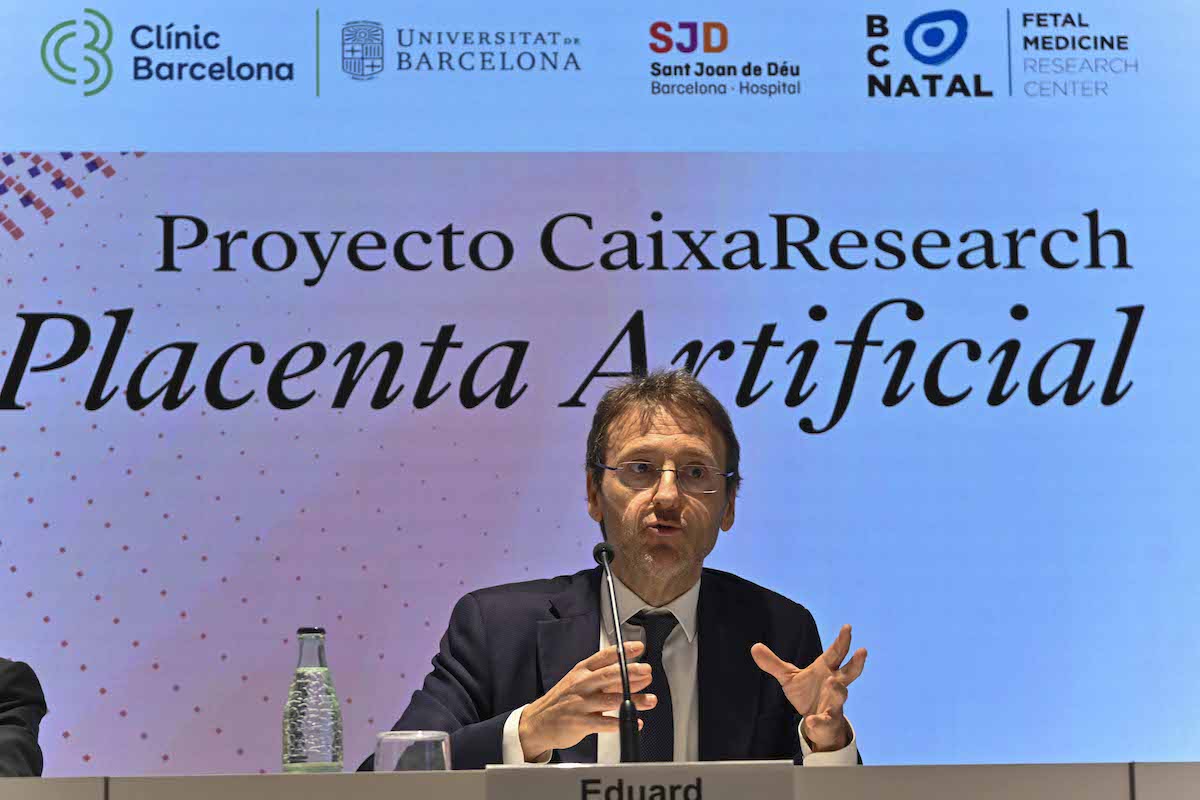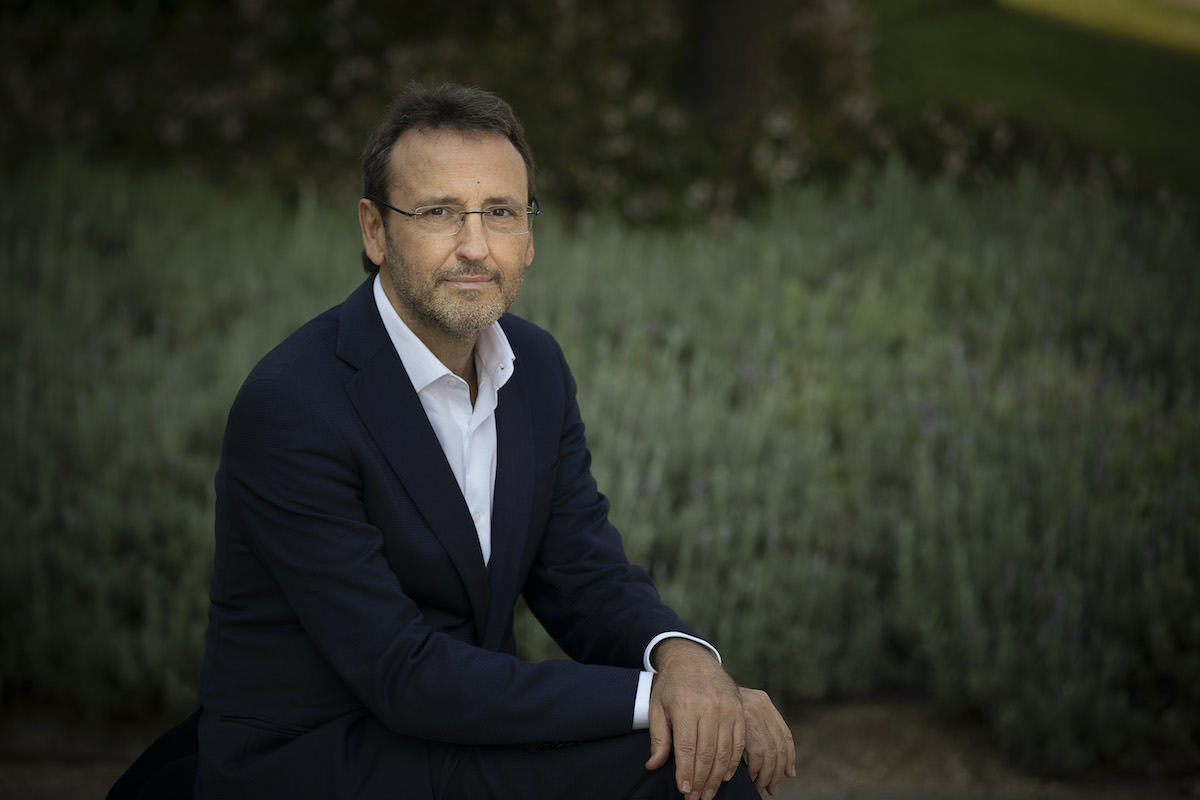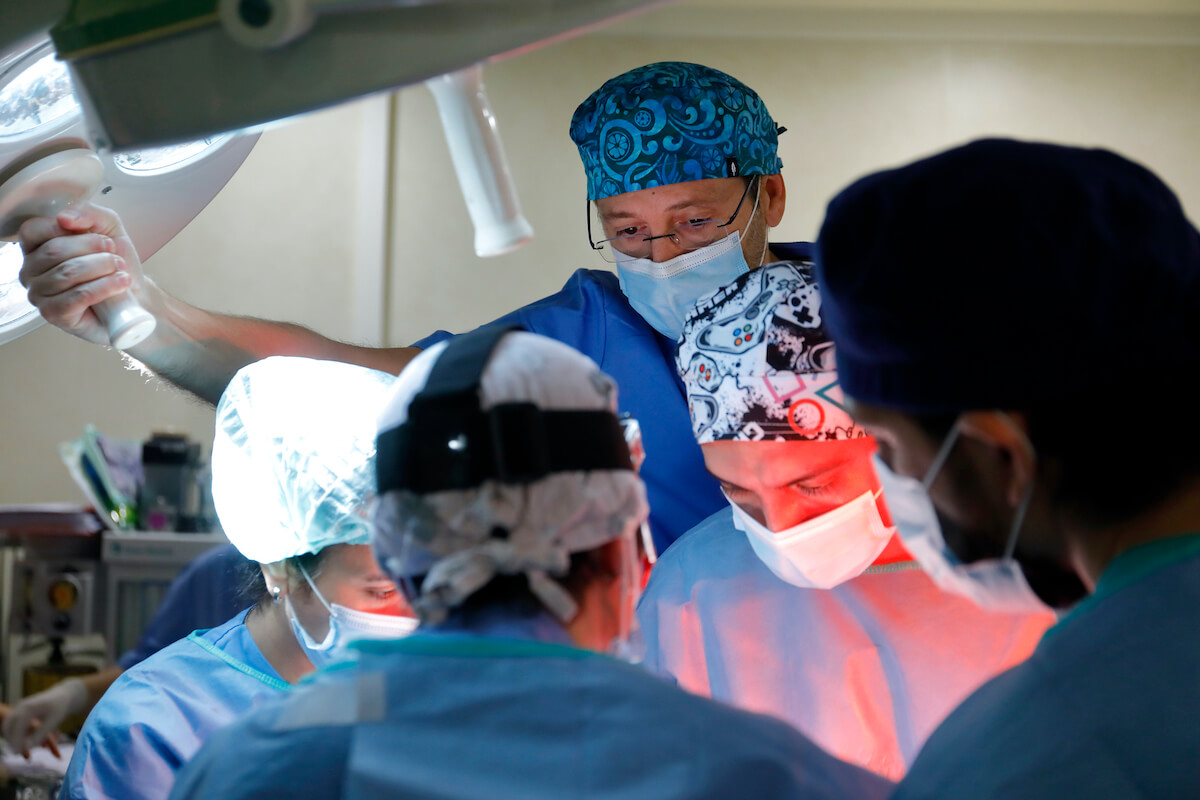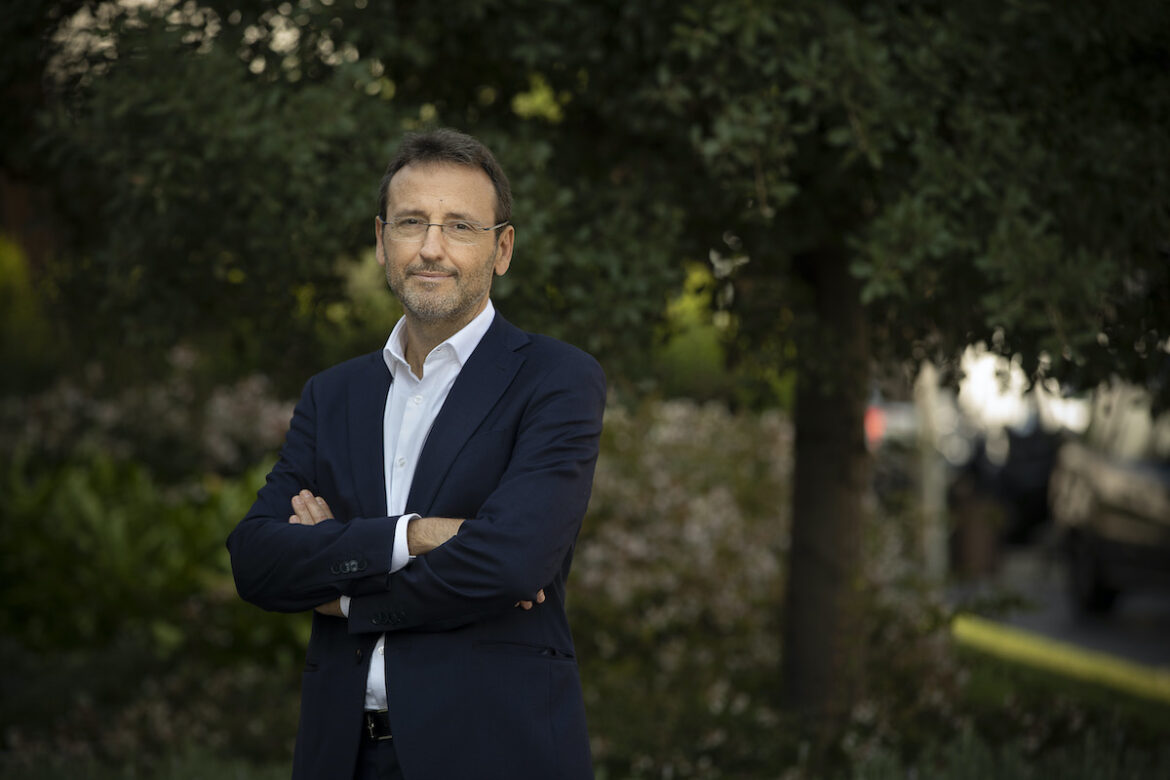Specialist in fetal and perinatal medicine, diagnosis, therapy and fetal surgery, he has been directing for ten years BCNatalthe clinical and research center in fetal and neonatal medicine of international reference attached to Hospital Clínic Barcelona and Hospital Sant Joan de Déu. BCNatal integrates the maternal-fetal medicine and obstetrics, gynecology and neonatology departments of these two first level university hospitals. Eduard Gratacós is also a professor at the University of Barcelona, has supervised more than 40 doctoral theses and has trained more than 400 doctors of different nationalities.
He is in charge of the research groups of Fetal Medicine FRCB-IDIBAPSandCIBERER and has published more than 600 articles in scientific journals with more than 31,500 citations. He has been the principal investigator of more than sixty national and international projects, with funding of 30 million euros in fifteen years. Currently, he leads the Interdisciplinary Program for the Development of an Experimental Prototype of Artificial Placenta and its Clinical Application Evaluation. Dr. Gratacós is the author of 9 months from the inside (Columna), a journey to kilometer zero of our life, through the development of the fetus, week by week.
—In June 1999, at the Vall d’Hebron Hospital, Eduard Gratacós performed the first fetal surgery in Spain. He entered a uterus to correct a blood flow anomaly (feto-fetal transfusion) between the fetuses of two twins sharing a placenta. Saving life before birth. Where did you learn how to do it?
—Strictly speaking, I started in Barcelona, because here we had an animal model. But I quickly had the opportunity to go to work in Belgium on a very large European project on fetal surgery, at the University of Leuven, which had just been funded by the European Community. I was fortunate to be selected as the coordinator of that project, and from Belgium we developed many of the surgeries that are performed today.
—In fact, he came from Leuven to perform that first intrauterine intervention in Spain.
—It was a pioneering stage, in which three or four hospitals in Europe were the only ones doing this, and we were all united in a common project. When I returned to Barcelona, they continued to be pioneering years. By 2005, this learning began to expand progressively and today all major hospitals in any country have fetal surgery techniques. The first one in Spain was in the Vall d’Hebron Hospitalwhere I worked my first five years when I returned to Spain —from 2001 to 2005 he was the head of the Fetal Medicine Unit. I then moved on to the Hospital ClínicWe moved the fetal surgery program, which is still today the largest surgery program in Spain, even though there are other hospitals where it is performed, in Madrid, in Vall d’Hebron, and in other hospitals in Barcelona. Maybe there are five or six in total, not many, but during the first years, in Vall d’Hebron, apart from doing the first one, we were the only ones doing it.
—Since then, what have you learned about pregnancy?
—Research has come a long way and a new discipline known as fetal medicine has been created, which has made it possible to diagnose many of the problems that fetuses can present, and to understand how they affect health throughout life. Also in recent years we have made great advances in the treatment of serious diseases that affect women. We have greatly reduced preeclampsia, which is a very important hypertensive disease, but there are still very important challenges, such as prematurity and the treatment of some fetal and maternal anomalies. We have to finish developing new tools that allow us to treat the most extreme prematurity, which we have not yet solved. That is why the artificial placenta project we are developing in Barcelona is very important, a system designed to reproduce and prolong the physiological conditions of the maternal uterus to allow the correct growth of the organs of neonates aged six months or less. We want to increase the chances of survival —so far twelve days with good fetal condition have been achieved with an animal model— and to minimize the sequelae suffered by many very premature babies.
Artificial placentawill mean a paradigm shift in the treatment of very extreme preterm infants.
—It is the project CaixaResearch Artificial Placentaunique in Europe. Four other teams in the United States, Canada, Japan and Australia are developing experimental placenta models. But in Europe, Barcelona is leading the way.
—At the moment we are one of the few centers in the world that have an artificial placenta project to change the most extreme prematurity with the results we have right now. It is still an experimental project, financed by the La Caixa Foundation with many millions of euros —3.35 million in the first phase and 4.3 million more for a second phase of experimental validation that will allow us to make a final clinical approach—. We are really pioneers in this case, because there are only four others in the world. And it is one of the most revolutionary and unique research projects that can be carried out today in fetal medicine. Just having an experimental platform such as the one we are building will allow parallel research of great importance to understand normal and abnormal fetal development. This will expand the capacity to attract R&D investment in Barcelona, Catalonia and Spain, and will also bring us a new generation of techniques and procedures that will revolutionize current fetal and neonatal medicine. It will mean a paradigm shift in the treatment of very extreme preterm infants.
—At what point is this prototype placenta?
—We are now working on the second phase, which will last until 2026. We expect this 2024 to extend the survival time from the current twelve days to more than three weeks. To achieve this, we will focus our efforts on technological improvement, in collaboration with industry, optimizing the medical devices used, such as cannulas or membranes for oxygenation. In addition, we have to design and describe the necessary protocols for the transition in neonatal life, that is, the birth of the fetus from the artificial placenta to extrauterine life, so that it begins to make use of its lungs like any newborn. So far we have done it with a sheep animal model, but we will test it with swine, in order to demonstrate the ability to transfer the system to other species. And once we assess the long-term effects on brain, cardiac, pulmonary and metabolic development, we can make all the (ethical and legal) preparations for a first clinical trial to be approved.

—Besides artificial placenta, in the field of fetal medicine, what else does Barcelona excel in?
—The research done in Barcelona is at the forefront of what is being done in the world and we work on practically all the issues of concern. We have performed several fetal surgery techniques for the first time in Barcelona and we are pioneers in the research of fetal growth retardation and fetal programming. We have been very pioneering in describing how the circumstances of fetal life can produce brain and cardiovascular changes that can last a lifetime, and the opportunities to anticipate them. We have also been very pioneering in demonstrating how maternal lifestyle has a very large impact on fetal development and health.
—A clinical trial by his BCNatal team recently demonstrated that the Mediterranean diet and stress reduction during pregnancy improve neurodevelopment in children in the first two years of life.
—With the research we have done in Barcelona we have shown that lifestyle interventions have beneficial effects. We have investigated it mainly for underweight and preeclampsia. We have not investigated it as much for prematurity, although we believe that there is probably a clear effect on it as well, but we have not evaluated it in our study. It is likely to be equally beneficial, because the Mediterranean diet has an anti-inflammatory effect on the whole organism, and stress reduction also has a relationship with inflammation. All this is good for health in general, and pregnancy is no exception, because in pregnancy it happens as in the rest of life: the better the lifestyle, the risk of complications plummets.
“Pregnancy is sometimes telling us how to avoid diseases for the rest of life, both in the baby and in the mother.”
—We tend to think that during pregnancy the mother’s lifestyle is exemplarily healthy, but there are still pregnant women who smoke, and not only tobacco. Even during pregnancy, cannabis use is trivialized.
—It is difficult to know with certainty the prevalence of tobacco use in pregnant women, but we believe it would be between 15 and 20%. Neither tobacco nor marijuana smoking is detected, because it is not looked at, but it surely is. Tobacco affects a lot because it interferes with fetal growth and neurological development, this has been demonstrated even with very small amounts of consumption and passive smoking. Therefore, smoking is very harmful and you should not smoke a puff or be near where you smoke. Regarding the consumption of marijuana, I would be concerned because it is a psychotropic, it acts on the brain, and I would be very concerned if the derivatives were passed on to the fetus, because they would affect the development of its brain and, therefore, it would have to be totally prohibited. The mother should be aware that the same amount of what she is taking is being taken by the fetus, with the difference that the brain of the fetus is developing. Therefore, very small doses could have very negative effects.
—Tobacco consumption is one of the causes associated with low birth weight in newborns, is it also associated with the prematurity that causes so much concern? Has it increased in recent years?
—Not up, but not down. We are at a prevalence of between 8 and 10% of births, depending on the population and areas of the world, but it is one of the big problems we have today. And as to what are the causes or to which it is attributed, we know that, although we have corrected a lot of the problems of deficits in our societies, we now have the problems of modern society, such as over-nutrition, sedentary lifestyles, unhealthy lifestyles and stress. All this clearly contributes to a worsening of the major pathologies of pregnancy. And, therefore, one of the big challenges is how to act on lifestyle, which is one of the most difficult things. In the case of prematurity, we also know that the increase in the age at which women have children, and in Spain and Catalonia it is terrible, at ages that are not ideal, may also have something to do with it. Although the most important thing is lifestyle, but age can also explain it, because there is more need for help for conception. Not because infertility increases, but because children are had at older ages, and then there is a greater need for help and multiple pregnancies may occur. All this adds up and means that prematurity rates have not been falling for years, and this means more complications and more health care costs, which is one of the great challenges we face.

—In the book 9 months from the inside (Paidós), stresses the importance of lifestyle during pregnancy.
—Yes, this book explains fetal development, but it also insists a lot on the importance of empowering the mother, not to avoid everything, but to reduce a lot the risk of problems, with good information and a good lifestyle. It is a book that not only offers interesting information, but is also very useful. Mothers in general do not know more about fetal development, but there is also a lot of misinformation about gestation in general. That is why it is so important to invest in information brochures. Perhaps it is necessary to insist especially on those people who have already had a risk, previously, or have it because of age, or because of some other factor that identifies more risk in them. Empowerment is extremely important because we know that, with a good lifestyle that is strictly well led, problems can be reduced by half.
—Is there still no alternative test to amniocentesis?
-No. DNA analysis in maternal blood is a screening test that tells us, in a very reliable way, if the risk of any anomaly is high or low, this has improved a lot. But we do not yet have as much information as amniocentesis in maternal blood, perhaps in the coming years it will be able to advance, but today it is not yet the case, and in some cases it is necessary to perform an amniocentesis or a chorion biopsy, which are the two tests that we perform. In any case, the risks of amniocentesis have been greatly reduced and at present, in expert hands, the risk of this test is considered to be one per 1,000. When it has to be done, really, it’s a very safe test.
“Empowering the mother doesn’t prevent everything, but it does greatly reduce the risk of problems, with good information and a good lifestyle.”
—Now many more things must be detected before birth.
—We have been able to detect many malformations that are very serious, even lethal, that give the child a very poor quality of life, and these anomalies or diseases can be detected prenatally and the couple has the option of terminating the pregnancy.
—What are the most common pregnancy pathologies today?
—1 or 2% of pregnancies have some fetal anomaly and the most common have always been cardiac anomalies and then, less frequently, but also quite a lot, neurological anomalies, and all the rest. If we talk about pregnancy pathologies, the most prevalent ones are the major obstetric syndromes, such as prematurity, which we do not manage to reduce in any way, growth retardation and hypertensive disorders, such as preeclampsia. This is a disease that some women may have–between 2 and 8% of pregnancies–during the second half of gestation. Women who have it have elevated blood pressure, high amounts of protein in the urine and swelling that does not go away. And it can also occur in the postpartum period.

—How does preeclampsia develop?
—Preeclampsia can cause the placenta, which provides oxygen and nourishment to the baby, to not get enough blood. If the placenta does not receive enough blood, the baby receives fewer nutrients and may be a low birth weight baby. In addition, there may be a need to deliver immediately and premature infants are at increased risk for serious complications, some of which last a lifetime and require ongoing medical care. In severe forms of the disease, there may be hepatic, renal and neurological involvement, coagulation disorders and even the appearance of seizures (in these cases it is called eclampsia). In fact, preeclampsia is one of the leading causes of death among women and babies worldwide.
—Do many pregnant women from outside Catalonia come to Barcelona for treatment?
—We receive patients from all over Spain and other countries. Perhaps from abroad it is less and less common, because there are more and more countries where they do fetal surgery, but we still attend many.
“We have managed to detect during pregnancy many malformations that are very serious, even lethal, that give a very poor quality of life to the child.”
—Do you also travel to operate in other countries?
—I have done it on occasion, but it is not really an option that we promote, rather we try to get professionals to come to Barcelona for training and then we support them when they return to their country. I believe that what needs to be done is to develop the capabilities in the center itself.
—What is expected to be resolved in the coming years?
—I think one of the radical changes we will have will be first some improvement with personalization, we will be able to detect risk and prevent more and more, and we are already doing that with preeclampsia. Prematurity is the great challenge, and one of the great changes for this that will be very revolutionary will be the artificial placenta, although it may take 5 or 10 years, or maybe 15, but it will allow us to radically reduce the problem of the most extreme prematurity.
—Are these the main challenges worldwide in research related to fetal medicine?
—In research in Barcelona and around the world, the main objectives are very much focused on the prevention of the major problems of pregnancy, especially preeclampsia and fetal growth problems, and understanding how these problems end up affecting both the baby’s and the mother’s life. We know that, when preeclampsia occurs, there is more cardiovascular risk for the rest of life, and we are now trying to understand and stratify this risk. Pregnancy is sometimes telling us how to avoid illness for the rest of our lives. Both in the baby and in the mother.












